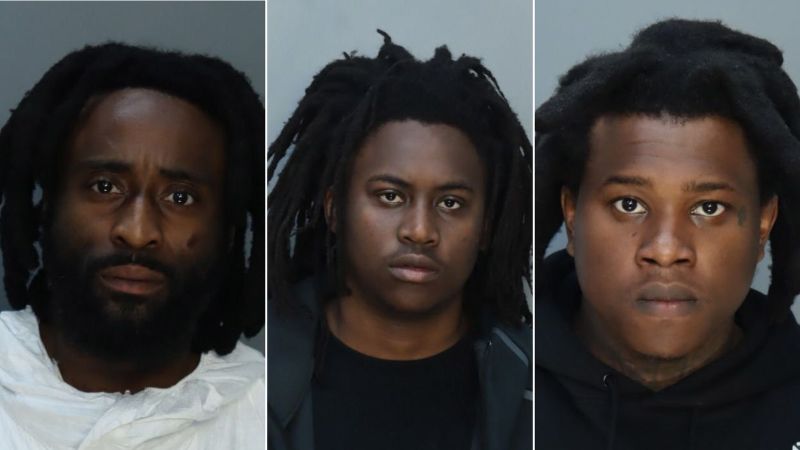
4 suspects in 2021 mass shooting outside a Miami-area concert are charged with murder
CNN
Four men were arrested and charged with murder Thursday in connection to a 2021 mass shooting at outside a Miami-Dade County concert venue that killed three people and wounded at least 20 others – one of the largest mass shootings in the county’s history.
Four men were arrested and charged with murder Thursday in connection to a 2021 mass shooting outside a Miami-Dade County concert venue that killed three people and wounded at least 20 others – one of the largest mass shootings in the county’s history. The suspected gunmen – Willie Zavon Hill, 27; Allen Gregory Chambers Jr., 30; Eugene Anthony Holmes, 22; and Jacarree Brian Green, 30, – each face three counts of first-degree murder, 20 counts of attempted murder and a single count of conspiracy to commit murder, according to an affidavit. Hill also was charged with evidence tampering. Investigators said he disposed of a vehicle used in the crime by dumping it in a canal, according to the affidavit. “Miami-Dade was shocked, indeed everyone in South Florida was shocked, when 23 individuals were shot during the Memorial Day Weekend on May 30, 2021,” said Miami-Dade County state attorney Katherine Fernandez Rundle at a Thursday press conference. The shooting outside the El Mula Banquet Hall near Hialeah stemmed from an ongoing rivalry between two gangs identified as the “Bricks” and “Back Blues/Apes” in Miami-Dade County, according to the affidavit. On the night of the shooting, the banquet hall was being rented out by a music group that featured several rappers affiliated with the “Back Blues” gang, the affidavit states. Shortly after midnight, a group of hooded men pulled up to the venue in an SUV and fired indiscriminately into a crowd standing outside, authorities said.

Andrew Cuomo and Zohran Mamdani bitterly clashed over age and experience Thursday in the final debate before New York City’s Democratic mayoral primary, as Cuomo warned that electing the progressive state assemblyman is unprepared for the job and Mamdani hammered the former governor over scandals during his time in Albany.

On Wednesday, the Department of Homeland Security posted a striking graphic on its official X account. Uncle Sam, a symbol of American patriotism, is depicted nailing a poster to a wall that reads, “Help your country… and yourself.” Written underneath the poster is the sentence, “REPORT ALL FOREIGN INVADERS,” and the Immigration and Customs Enforcement hot line.





















 Run 3 Space | Play Space Running Game
Run 3 Space | Play Space Running Game Traffic Jam 3D | Online Racing Game
Traffic Jam 3D | Online Racing Game Duck Hunt | Play Old Classic Game
Duck Hunt | Play Old Classic Game









